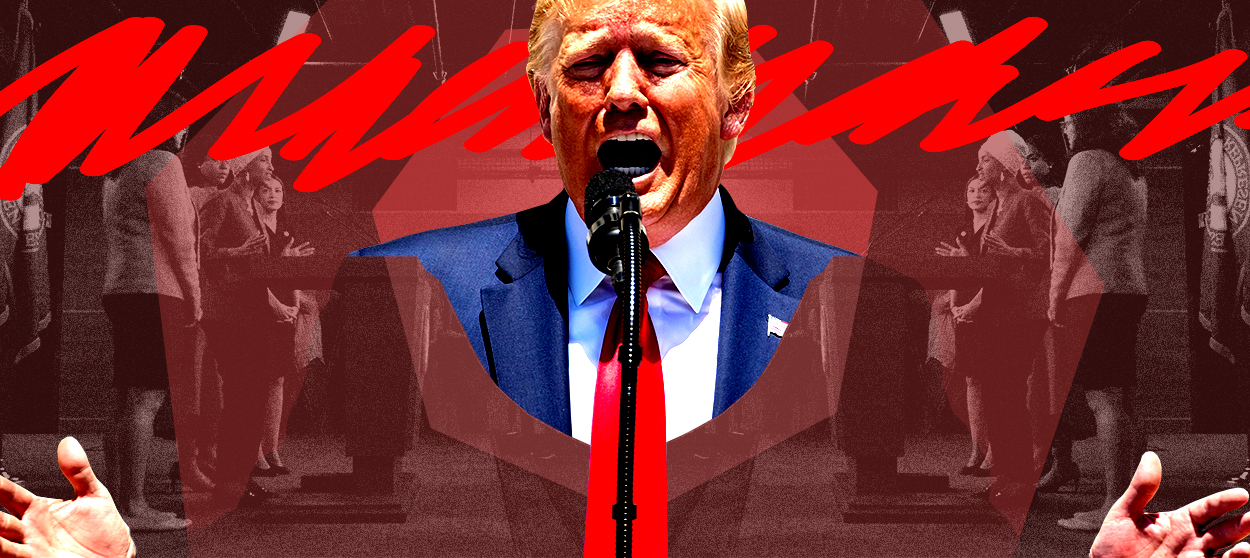Trump and the everlasting problem of men demanding apologies from women
How contrition became a weapon wielded against strong women


A free daily email with the biggest news stories of the day – and the best features from TheWeek.com
You are now subscribed
Your newsletter sign-up was successful
It was a busy weekend for President Trump on Twitter. You've no doubt heard the story by now: In the span of 24 hours, Trump posted a series of rapid-fire tweets aimed squarely at "the Squad" of four Democratic congresswomen of color — Reps. Alexandria Ocasio-Cortez of New York, Ilhan Omar of Minnesota, Ayanna S. Pressley of Massachusetts, and Rashida Tlaib of Michigan — telling them to "go back" to their home countries. These tweets revealed, yet again, the president's deeply racist and misogynistic character. But it was one of his follow-up tweets, posted July 15th, that demonstrated an equally troubling pattern with which many women are all too familiar: men demanding apologies from women.
"When will the Radical Left Congresswomen apologize to our Country, the people of Israel and even to the Office of the President, for the foul language they have used, and the terrible things they have said," Trump asked in his tweet. The question smacks of sexism: A grown man chastising women as if he were somehow superior to them, as if they need to be "put in their place." Never mind the foul language he himself has used to describe everything from his political opponents to entire countries. Never mind that most of Trump's accusations against these congresswomen were false. It didn't matter. These women, Trump believed, had misbehaved, and needed to pay the price of public humiliation and contrition. This kind of gaslighting behavior is peak misogyny, and most women are very familiar with it.
The phrase "I'm sorry" may seem small and inconsequential. It's only two words and three syllables. And of course, men have been asked or forced to apologize for their actions, too. But the demanded apology's power over women is huge: Research shows that women are society's chief apologists, saying "I'm sorry" far more often than men. Indeed, society's tolerance for women who are anything but quiet and polite is low, and the punishment imposed on such a woman is shame and remorse. And it's not just society: Women themselves believe they should apologize more often for their actions. One 2010 study published in Psychological Science suggested that "women have a lower threshold for what constitutes offensive behavior."
The Week
Escape your echo chamber. Get the facts behind the news, plus analysis from multiple perspectives.

Sign up for The Week's Free Newsletters
From our morning news briefing to a weekly Good News Newsletter, get the best of The Week delivered directly to your inbox.
From our morning news briefing to a weekly Good News Newsletter, get the best of The Week delivered directly to your inbox.
Why is this? As Canadian sociologist Maja Jovanovic explains in her TEDx talk, women "have been conditioned from a very young age to always be thinking about how other people might feel." We're taught to be contrite, polite, demure, and dutiful, and we feel bad if we're not. But here's the rub: Apologizing makes us feel less confident in ourselves. "It's intimately linked to a word called 'humble' ... having or showing a low estimate of one's own worth," Jovanovic says.
With this in mind, it becomes clear the apology is a tool — or perhaps a weapon — wielded by misogynists to suppress strong, confident women by making them feel humiliated, ashamed, and small. Trump, in particular, has a history of going on the attack any time he feels threatened or intimidated by a strong woman, and his is a predictable MO, one that he established long ago. He's afraid of these four congresswomen because they're not afraid of him. They're not going to acquiesce or back down, and so Trump falls back on naming, shaming, and demanding repentance.
Of course, Trump is just the latest in a much-too-long line of men who think women owe them an apology. Examples exist throughout history. More recent examples can be found in politics and pop culture and sports. There was the time Janet Jackson was forced to apologize for the nip slip wardrobe malfunction during her Super Bowl halftime performance in 2004, while co-performer Justin Timberlake made no such apology and emerged from the scandal unscathed, even elevated. There was the time last October when Sen. Lindsey Graham (R-S.C.) called on 2020 Democratic presidential candidate Sen. Amy Klobuchar (D-Minn.) to apologize for being part of a non-existent "smear campaign" against him. Earlier this month, U.S. women's soccer star Megan Rapinoe was the subject of wide criticism when she took a stand and said, in no uncertain terms, that she would not be visiting the White House following the team's World Cup win.
Let's be clear: Women do not owe men anything. Not their time, not their attention, and certainly not their apologies. We have nothing to be sorry for, and neither does the Squad.
A free daily email with the biggest news stories of the day – and the best features from TheWeek.com
Melissa Blake is a freelance writer and blogger from Illinois. She covers disability rights and women's issues and has written for The New York Times, Cosmopolitan, Good Housekeeping, Glamour and Racked, among others. Read her blog, So About What I Said, and follow her on Twitter.
